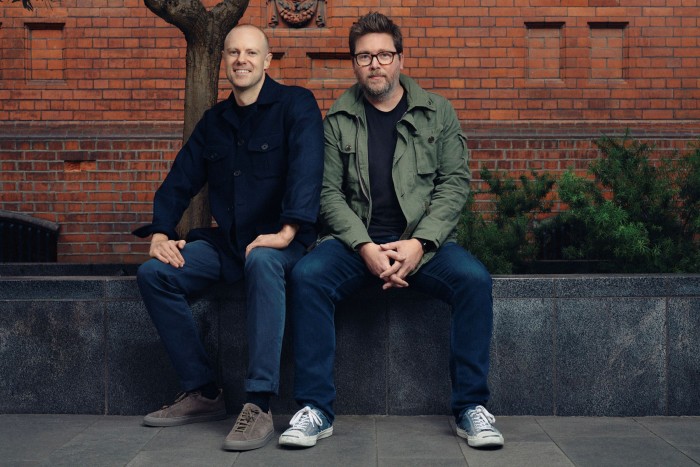Biz Stone, Twitter co-founder, on being an investor that never lets go
The man who helped create Twitter, a social network designed for brevity and instant gratification, is now preaching the virtues of patience and long-term thinking in tech investment.
Biz Stone, along with business partner and investor Fred Blackford, sees that as the grounding philosophy behind Future Positive, the multi-stage investment firm the pair founded in early 2019, with an intent to keep hold of their investments long after the traditional point of departure.
“I always joke around about the word ‘exit’,” Stone says. To him, a company going public in today’s frothy market should be seen as a “beginning point”, and shouldn’t mark the end of an investor run. He says that today more value is being created in the public markets than in private investments, and that investors may be missing out by cashing out early.
To date, Stone and Blackford have raised $250m for their fund and have invested $160m.
Stone’s means to invest comes thanks to his pivotal role as an early pioneer in social media. His real name — Christopher Isaac Stone — is one of just two written on the 2007 patent application for the tech underpinning Twitter. The other is Jack Dorsey, the company’s current chief executive.
Stone helped to build Twitter’s culture before he left in 2011, only to return in 2017, at a time when the company was stagnating. He was to guide the business back to “that energy, that feeling” of its origins, or as he put it at the time, “the job description includes being Biz Stone”.
Though no longer officially at Twitter, Stone claims he continues to act as an “informal” adviser. Today, he reflects on that second spell as a time when he helped Twitter mature, particularly on content moderation and monetisation. “I was banging on the drum about [there being] so much money laying around the floor,” he says.
Throughout his time at Twitter, Stone built up a portfolio of investments, starting with early bets in Pinterest, the image-sharing network, in 2009 as well as the plant-based meat substitute company Beyond Meat, where he is currently a board member. He backed Slack, the workplace software company that went public at a value of $23bn, and Square, the financial services company co-founded by Dorsey.

While Dorsey evangelises on a crypto-powered future, Stone concedes it’s all “a little bit beyond me”. That hasn’t stopped him from backing an investment in Nifty’s, an non-fungible token marketplace, in March 2021.
“I get it on a basic level,” he says. “I’ve just been more people first. What do people need? How can I help them? What kind of technology will serve them?”
Future Positive is an effort to dig out such investments, with an emphasis on emerging geographical markets. Blackford, whose imaging start-up Swing Technologies was acquired by Microsoft in 2017, was introduced to Stone by a mutual friend. Using money they had raised for an aborted deal to acquire Polaroid, the pair made a late-stage investment in Beyond Meat ahead of its IPO in May 2019.
“For us the thinking has been, ‘what are the companies that we would never want to sell?’” says Blackford, who is looking for “a company we want to build a position in and never want to sell, and just hold for decades”.
A more long-termist approach is certainly becoming en vogue — mostly thanks to valuations in the public markets soaring over the past 18 months.
Last month Sequoia Capital, one of Silicon Valley’s largest VC firms, announced it would diverge from the traditional model and create one single overarching fund, one which would allow it to keep hold of its investments for longer than usual, with partners normally expecting returns within a decade. Stone and Blackford say their firm is approaching deals with the same philosophy.
Their biggest investment so far began at the start of the pandemic in March 2020, when Future Positive led a $50m Series C round for NotCo, a Chilean foodtech company that has created plant-based substitutes for mayonnaise, milk, ice cream and more.
The deal was sealed despite some unfortunate timing. With a term sheet ready, the US was closed to Europeans because of the coronavirus crisis. It left Blackford, who is British, stranded in Santiago with some investors backing out as global markets tanked. But they got the deal done.
“I’m really glad that we did,” Blackford adds, “because a year later, NotCo had [expanded] to the US, they’d launched with Whole Foods, they had negotiated partnerships with Starbucks — they tripled revenue.”
A subsequent Series D round earlier this year, led by Tiger Global, saw NotCo’s value increase to $1.5bn. Future Positive contributed an extra $50m.
Blackford says this deal demonstrates the potential of companies in emerging markets at a time when some investors are “throwing their hands up and complaining” about too much competition closer to home. Other Future Positive moves include backing Pakistan-based commerce company Airlift, Argentine fintech provider Pomelo, and São Paulo-based social payments platform Divy.
Stone’s philosophy is simple. He says he seeks companies that can “redefine the success metrics of capitalism” — businesses that “are doing something for society or the biosphere”. “Sure we’re making a bunch of money,” he adds, “but we’re going to do a whole lot of good along the way.”